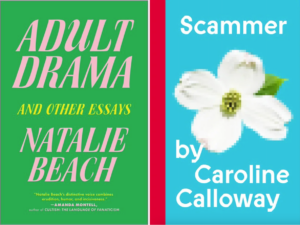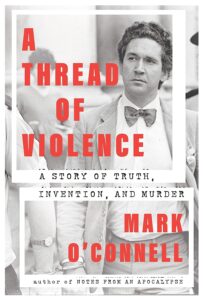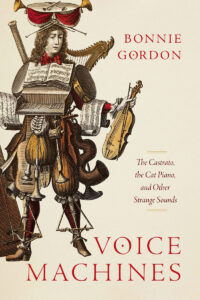
Our quintet of quality reviews this week includes Becca Rothfeld on Caroline Calloway’s Scammer and Natalie Beach’s Adult Drama, Rob Doyle on Mark O’Connell’s A Thread of Violence, Sloane Crosley on Tom Rachman’s The Imposters, Jo Livingstone on Bonnie Gordon’s Voice Machines, and Hannah Giorgis on Tamara J. Walker’s Beyond the Shores.

“Adult Drama came out this week, four days after Calloway’s self-published memoir, Scammer, available for purchase for a whopping (but worth it?) $65 on her website. For a while, I wondered if Calloway’s opus actually existed. My anxiety was not assuaged when she referred to me as ‘my queen’ and inserted a flutter of butterfly emoji in her responses to my increasingly frantic emails about an advance copy … As a committed Calloway apologist, I wanted to dislike Adult Drama, but I could not manage it. Sure, Beach’s debut is sometimes stiff and dutiful. A meditation on her stint as a cashier is interrupted by a needless lecture on the history of shopping, seemingly only because ‘braided essays’ are in fashion. And admittedly, ‘I Was Caroline Calloway,’ nominally the book’s central attraction, is sensational as a story though middling as a piece of prose. Yet a more self-effacing brand of charisma emerges over the course of the collection. Beach may be a more conscientious character than Calloway, and her path to publication may be more conventional, but she, too, is transforming her life into theater as fast as she can live it … Despite its title, Adult Drama is a decidedly adolescent book—sometimes in an irksome way, but mostly in a touching way. Its subject, after all, is the searching tremulousness of youth … Beach is a talented essayist with a promising career ahead of her. Calloway is a lunatic who has already written a masterpiece … Woe to controversial internet personalities who cannot write, but all is forgiven if the eventual book succeeds. The important thing is that Scammer is good: outrageous, turbulent and as raw as a wound, but good, the kind of book you read in a single shudder … Call Calloway’s imaginative posturing scamming if you want to. I prefer to call it art.”
–Becca Rothfeld on Caroline Calloway’s Scammer and Natalie Beach’s Adult Drama (The Washington Post)

“If I’m making it sound as if O’Connell has demeaned the gravity of his subject by deploying the bells and whistles of postmodernist meta-trickery, I assure you this is not the case. The conjuring of labyrinths and dark fictive mirrors enhance the book’s ghostly power and underscore its deadly seriousness. It reads like a seance with the spirits of the still-living. Immaculately paced, A Thread of Violence generates a suspense that is formal and narratorial as much as it is a corollary of genre: we read it rapt with curiosity as to how the author will avoid the ethical pitfalls up ahead, how he can possibly pull this off without sensationalism or vulgarity. The moral murkiness of writing such a book at all is intrinsic to its architecture: there’s no getting around that, by fixing his attention on a double murderer, the prestigious writer effectively signs an endorsement on the jacket cover of Malcolm Macarthur’s life, declaring it darkly riveting, profound in its moral implications … Eschewing the jokes and stylistic brio of his earlier work in favor of a stark lucidity, O’Connell sees in the ‘highborn savage’ Macarthur a grotesque mirror to his own upper middle-class privilege, and in his crimes an irreducible mystery that is indistinguishable from blunt mundanity. Resolved not to lose sight of the horror of what Macarthur calls his ‘criminal episode,’ O’Connell nonetheless grants his subject a fair hearing, writing about the elderly murderer with, if not quite a redeeming empathy, a spooked and perplexed grace … A Thread of Violence instils the certitude not only that no one else could have written this book, but that no other need ever be written on the subject. It’s a marvel of tact, attentiveness, and unclouded moral acuity. I admire it without reserve.”
–Rob Doyle on Mark O’Connell’s A Thread of Violence (The Observer)
“Tom Rachman has an ear for the washed up, for balls of human desperation, for outsize prides with scratched patinas … The novel is filled with enough twists to make O. Henry blush. What happened to Dora’s brother? Is the woman her daughter befriends during the pandemic to be trusted? Who is real, who is fake, and is everyone merely a Mittyesque iteration of Dora? (Each protagonist is some manner of writer) … The disparate plot threads do come together, some meaningfully, some clumsily. When the novel works, one feels the pulse of Dora’s humanity beneath her bitterness as she ties up loose ends. But Rachman has overestimated the reader’s investment in Dora herself. It’s not that she’s unlikable (she is, but who cares?); it’s that he has so completely ceded the floor to those in her orbit … Readers of this novel will face a choice: Submit to the construct, trusting that Rachman will come around with answers and revelations, or, well, be annoyed by it. Like The Imperfectionists, The Imposters reads as a collection of interconnected stories, which means that if aspects of the larger conceit prick at you—important new characters right up until the end, formatting tricks, wonky timelines—they will also prick at you on a smaller scale … To delve so deeply and move on is a skill—to be sure, there are many delights in this book—but to intentionally not telegraph which plots are worth retaining means this novel is missing the emotional core of Rachman’s previous work, and there’s an all-you-can-eat Rashomon buffet in its place … it’s as if Rachman is standing at the apex of his significant talent and sending his characters down the tracks, just to see where they land. Others may find it all to be screaming fun.”
–Sloane Crosley on Tom Rachman’s The Imposters (The New York Times Book Review)

“This tension between the sensuality and religiosity of song is the organizing motif of musicologist Bonnie Gordon’s new book … This is how and why Gordon discusses the castrato in the language of machinery. The book’s subtitle mentions a ‘cat piano,’ a horrid and hopefully apocryphal notion formed by kittens supposedly penned in a row and made to squeak by keyboard-connected spikes striking their tails. Gordon shows how, in the context of new Galilean telescopes, which prosthetically enhanced the human eye, and advances in hydraulic and air-powered musical organs, the cat piano and the castrato…fall into the same category of instruments “mechanized” by technologies like surgery, training programs, and cages. (Gordon is wise to leave much of the detail of the surgeries and the traditions that formalized them to the end of the book, which will at least make readers hoping for scandalous tidbits work for their gratification.) Gordon’s argument lifts off where she connects the language of mechanization to the backlash against the sensual provocations of the castrato voice … The question of the morality of alterations to the body concerning sex and gender is once again at the forefront of right-wing political organizing. Gordon is undistracted by the transphobic explosion in contemporary politics, confining herself to the merest gestures toward the Supreme Court and other implications for the present day—she always centers the music. And yet, her argument is undeniably topical: Voice Machines insists that individual people with bodies relate and respond to the creative cultures around them, as well as to each other, ungovernably. Resisting a closure that would be false, she lets the reader hear the harmony and name it for themselves.”
–Jo Livingstone on Bonnie Gordon’s Voice Machines: The Castrato, the Cat Piano, and Other Strange Sounds (4Columns)

“Beyond the Shores: A History of African Americans Abroad…contextualizes the eternal conundrum of [Richard] Wright’s work and politics by focusing on a different phase of his elective exile. Walker’s book constructs a lineage of Black Americans nurturing creative ingenuity through migration, making the case for freedom of movement as a companion to the freedom of expression. But it also elucidates the complex ways that anti-Black racism manifested both within the United States and in the countries where her subjects sought (and sometimes found) refuge … By situating his experience within a larger tradition of Black exodus, Walker paints a more nuanced portrait of the mordant literary figure—someone whose prescience, born partly of exile, still troubles the literary canon … Part of what makes Beyond the Shores so satisfying is Walker’s vivid depictions of the environments that her subjects entered when they immigrated. Their stories are rendered not solely through what they produced, but also through what they saw, what they ate, what they must have felt … With each story, Beyond the Shores builds a canon of Black creative expression that crosses both temporal and geographic barriers … Walker threads Beyond the Shores together with excavations of her own family’s journeys too: In the book’s prologue, she explains how hearing about her grandfather’s service abroad in World War II prompted some of her earliest childhood questions about Black migration. As others’ stories unfold, so does her own, giving the book the feel of a travel memoir without ever losing the gravity of a historical compendium. The interplay deepens the book’s storytelling; by observing the past through the lives of others, she seems to suggest, we can imagine an alternate vision of our own future.”
–Hannah Giorgis on Tamara J. Walker’s Beyond the Shores: A History of African Americans Abroad (The Atlantic)

